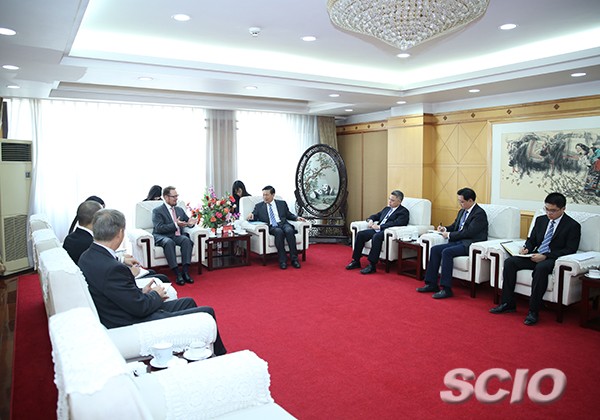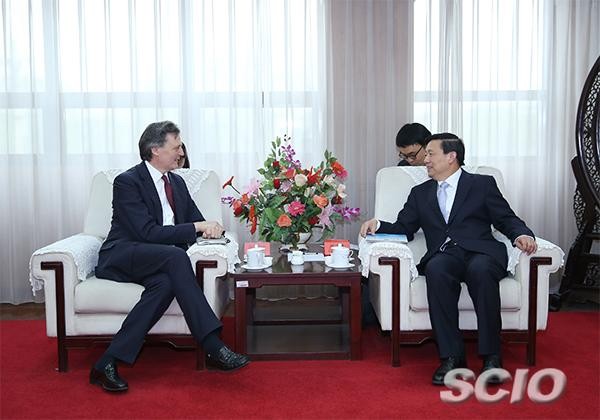Exclusive: Bombshell Photos Reveal Years of Meetings Between Bloomberg Executives and Chinese Propagandists in Beijing
Michael Bloomberg and his top associates at his namesake news conglomerate, Bloomberg LP, have regularly met in Beijing with top Chinese Communist Party (CCP) officials and propagandists, according to the Chinese government. I document these meetings, which have taken place over several years, in my book Breaking the News: Exposing the Establishment Media’s Hidden Deals and Secret Corruption, released May 18th.
According to documents reviewed while researching for this book, these propagandists regulate Bloomberg LP and control the extent to which the former Democrat mega-donor-turned presidential candidate’s business can access the gigantic Chinese market. Michael Bloomberg himself has spoken favorably—even glowingly—about China, President Xi Jinping, and other top Beijing officials. Bloomberg LP seemingly does a lot more business with China than its competitors.
Breitbart News is revealing images for the first time in American media that confirm the meetings. Details of the meeting, which appear here and in Breaking the News, originally were posted to an official Chinese state media website and have not yet been published in the U.S. press.
In the book, I reveal details of a year-long investigation into corporate media I conducted with a small team of researchers. Among the books’ numerous bombshells, I report on the true extent to which American media outlets are willing to go to curry favor with the Communist regime in China.
At these meetings, according to the Chinese government, the CCP and Bloomberg officials discussed, among other topics, “cooperation in the field of media,” “the introduction of Chinese stories to the world,” and “strengthening media cooperation between China and the U.S.”
Foreign distributors of financial data within China—of which Bloomberg is one of the largest—are forced to seek licensure from the State Council Information Office (SCIO), which is an agency under the auspices of China’s State Council. In other words, his ability to do business in China is subject to the will of what is effectively China’s executive branch. Since the Bloomberg license is renewed every two years, the pressure is always on to cozy up to top Beijing officials, and that’s exactly what Bloomberg appears to have done.
China’s SCIO is also commonly known as the Central Office of Foreign Propaganda.
China also can bar Bloomberg (and any foreign institution) from providing all sorts of financial information services in China. So, not only is Bloomberg’s access to the Chinese market subject to review and cancellation by the Communist Party every twenty-four months, the CCP can (and will) restrict any content it believes undermines the national interest.
Here are some of the details of the known meetings:
- On August 19, 2015: Michael Bloomberg met with Jiang Jianguo, director of the State Council Information Office (SCIO) and deputy director of the Publicity Department of the Communist Party of China; the latter office is the CCP’s department, which makes Jianguo the vice minister of propaganda. According to the Chinese government, they discussed “international exchange and cooperation in the field of media.”
- December 21, 2015: Bloomberg LP global executive vice president Kevin Sheekey met with Jiang as well as Zhang Fuhai and Zhang Hongbin, respectively the director general and deputy director general of the SCIO Internet Affairs Bureau. They run an arm of the Chinese regime that deals with Internet censorship. Sheekey would become Michael Bloomberg’s campaign manager for his 2020 presidential run.
- On July 13, 2016: According to China’s SCIO, Bloomberg executives met in Beijing with Chinese propaganda minister Jiang, this time to discuss “Belt and Road” strategic cooperation and the South China Sea. The Belt and Road Initiative (BRI) is China’s global project to gain economic dominance throughout the world via a massive network of infrastructure projects bankrolled by Beijing. BRI deeply intertwines China to other countries, particularly developing nations, via a network of investments. Some China skeptics consider the ambitious project essentially a “debt trap” scheme where nations ultimately default on loans extended to them, which allows the CCP to gain economic and political control over them. Often the Chinese are able to use their new economic leverage to expand their military capabilities in a given region. Beijing has staked a claim to much of the South China Sea, despite the fact that much of that territory is legally sovereign to Taiwan, Brunei, Malaysia, Vietnam, and the Philippines. China has little regard for the fact that the United States considers this behavior illegal; in fact, America’s position makes China furious. Beijing is engaging in similar behavior in the East China Sea, where they illegally claim territory that belongs to Japan, among other nations. Ecuador, Chile, and Argentina are among several other countries that have asserted China has violated their sovereign waters. Further details of the conversation between Bloomberg brass and the CCP aren’t public.
- June 7, 2017: Kevin Sheekey, who was then vice president of government relations at Bloomberg LP, again met with communist propaganda minister Jiang. According to the Chinese government, “they talked about China-U.S. media exchanges and cooperation, the introduction of Chinese stories to the world, and efforts to promote healthy and stable relations between the two countries.”
- July 11, 2018: Otis Bilodeau, senior executive editor of Bloomberg Asia Pacific, met with the vice minister of the SCIO, Guo Weimin, one of the top Communist Party spokesmen.

Guo Weimin meeting with a delegation headed by Otis Bilodeau in Beijing (Photo by Jiao Fei/China SCIO)
- April 13, 2018: John Micklethwait, editor-in-chief of Bloomberg News, met with the vice minister of the SCIO. From a Beijing readout: “The two sides held discussions on strengthening media cooperation between China and the U.S., enhancing understanding between Chinese and Western citizens, presenting China to the world, as well as China-U.S. relations.” In other words, the CCP claims that Bloomberg’s top editor advised a top communist official on how to “present China to the world.”

John Micklethwait, editor-in-chief of Bloomberg News, in Beijing with Guo Weimin. (Photo by Jiao Fei/China SCIO)
- May 9, 2018: Jiang Jianguo, the deputy propaganda minister, met again with Sheekey in Beijing. This time they discussed, according to Beijing, “expanding communication and cooperation between the media of China and the U.S., promoting understandings between Chinese and western citizens, as well as China-U.S. relations.”
Translation: the future campaign manager for Michael Bloomberg’s presidential run met yet again with one of the CCP’s top propagandists, and according to the Chinese government, they repeatedly discussed cooperation between the two nations and their media establishments.
This appears to go far beyond “cozying up to China.” According to the Chinese government, Bloomberg executives regularly fly to China to meet with top Communist Party members, including propagandists, in order to forge deep partnership on all manner of issues. In fact, this has been the culture at Bloomberg for at least a decade, apparently. In 2013, it was reported that then-Bloomberg News editor in chief Matthew Winkler likened members of the Chinese ruling class to Nazis — but emphasized to his journalists that if said “Nazis” felt judged, they were likely to kick the journalists out of the country.
In Breaking the News, I also delve into the details of Michael Bloomberg’s short-lived presidential run. In 2019, Bloomberg said in an interview that “Xi Jinping is not a dictator.” He most certainly is; he even made himself “president for life.” Bloomberg, an anti-climate change activist, has complimented China’s environmental policies despite the fact they release by far the most carbon dioxide of any country on earth.
Bloomberg himself remains one of the most powerful players in American media and in Democrat Party politics.
Yet, Bloomberg was not the only major news outlet to send representatives to Beijing to form ties with anti-American propagandists.
More details can be found in Breaking the News.










Comments are closed.